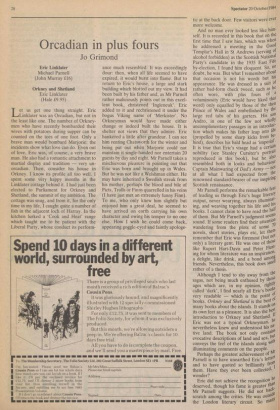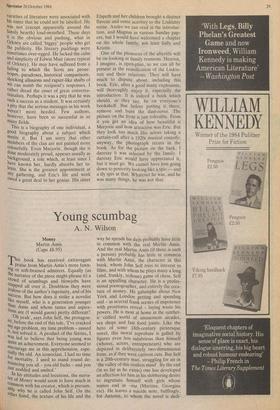Orcadian in plus fours
Jo Grimond
Eric Linklater Michael Parnell (John Murray £16) Orkney and Shetland Eric Linklater (Hale £9.95)
T et us get one thing straight. Eric Linklater was an Orcadian, but not in the least like one. The number of Orkney- men who have recently bombarded their wives with potatoes during supper can be counted on the toes of one foot. Only a brave man would bombard Marjorie: the incidents show what love can do. Even out of love, Eric was, of course, a very brave man. He also had a romantic attachment to martial display and tradition — very un- orcadian. Then, consider his house in Orkney. I know its profile all too well. I spent some very happy months in the Linklater cottage behind it. I had just been elected to Parliament for Orkney and Shetland, the summit of my ambition. The cottage was snug. and from it, for the only time in my life, I caught quite a number of fish in the adjacent loch of Harray. In the kitchen lurked a 'Cook and Heat' range which taught me to be patient with the Liberal Party, whose conduct its perform-
ance much resembled. It was exceedingly dour: then, when all life seemed to have expired, it would burst into flame. But to return to Eric's house, a large and stark building which blotted out my view. It had been built by his father and, as Mr Parnell rather maliciously points out in this excel- lent book, christened `Ingleneuk% Eric added to it and rechristened it under the bogus Viking name of `Merkister'. No Orkneyman would have made either change or indeed built the house. It is shelter not views that they admire. Eric hankered a little after grandeur. I can see him renting Chatsworth for the winter and being put out when Marjorie could not maintain it single-handed nor entertain 20 guests by day and night. Mr Parnell takes a mischievous pleasure in pointing out that Eric was born and brought up in Wales. But he was not like a Welshman either. He may have inherited a Swedish streak from his mother, perhaps the blood and bile of Picts, Trolls or Finns quarrelled in his veins (I have just met an extremely funny Finn). To me, who only knew him slightly but enjoyed him a great deal, he seemed to have arrived on earth carrying his own character and owing his temper to no one else. How I wish he could come back, appearing goggle-eyed and faintly apologe- tic at the back door. Few visitors were ever more welcome.
And no man ever looked less like him' self. It is recorded in this book that on the first time that I saw him, which was when he addressed a meeting in the Good Templar's Hall in St Andrews (serving of alcohol forbidden) as the Scottish National Party's candidate in the 1935 East Fife by-election, I found him eloquent. So, no doubt, he was. But what I remember about that occasion is not his words but his appearance. He was dressed in a suit of rather bad-form check tweed, such as he often wore, with plus fours of a voluminosity (Eric would have liked that word) only equalled by those of the then Prince of Wales and embellished by the large red tabs of his garters. His son Andro, in one of the few not wholly uncomplimentary passages in an introdUe' tion which makes his father leap into life (propelled by some sharp kicks from he:
hind), describes his bald head as 'imperial. ' It is true that Eric's visage had a certain nobility (see Stanley Cursiter's portrait reproduced in this book), but he also resembled both in looks and behaviour Captain Mainwaring of Dad's Army —rift at all what I had expected from the renowned standard-bearer of our inspiring Scottish renaissance.
Mr Parnell performs the remarkable feat of leading us through Eric's huge literary
output, never wearying, always illuminat- ing, and weaving together his life and his, books. I cannot claim to have read the hall of them. But Mr Parnell's judgment seers sound. If some readers find their attention, wandering from the plots of some lu
novels, short stories, plays etc, let than
remember that Eric was foremost (but Ot only) a literary gent. He was one of those like Rupert Hart-Davis and Peter Fleni' ing for whom literature was an inspiration' a delight, like drink, and a bond among friends. Nevertheless, this book does sine rather of a thesis.
Although I tend to shy away from the sagas, not being much enthused by those ages which are, in my opinion, righrlY called 'dark', I find nearly all Eric's books very readable — which is the point 0, books. Orkney and Shetland is the best of many books about the islands. It stands On, its own feet as a pleasure. It is also the best introduction to Orkney and Shetland. If Eric was not a typical Orkneyman, "`" nevertheless knew and understood his ir tive land. The book not only contains evocative descriptions of land and sea, h11, conveys the feel of the islands along with illuminating comments on the people. Perhaps the greatest achievement of IVP, Parnell is to have unearthed Eric's letters and to have quoted so brilliantly fro them. Have they ever been collected, wonder? Eric did not achieve the recognition he deserved, though his fame is greater the Mr Parnell suggests. He did not baFt. scratch among the critics. He was outgo' the London literary circuit. So many
varieties of literature were associated with his name that he could not be labelled. He was not (except apparently around the family hearth) loud-mouthed. These days it is the obvious and pushing, what in Orkney are called 'biggsy' people who get the publicity. His literary puddings were sometimes over-egged. He lacked the calm and simplicity of Edwin Muir (more typical of Orkney). He may have suffered from a failing to which the Scots are prone: tropes, paradoxes, historical comparisons, shocking allusions and rapier-like shafts of Wit can numb the recipient's responses. I rather dread the onset of great conversa- tionalists. Perhaps it was a pity that he was such a success as a student. It was certainly a pity that the serious messages in his work weren't more heeded. Few authors, however, have been so successful in so Many fields.
This is a biography of one individual, a good biography about a subject which merits it. But I am sorry that other Members of the clan are not painted more colourfully. Even Marjorie, though she is done moderately proud, appears usually as background, a role which, at least since I have known her, hardly absorbs her ta- lents. She is the greatest appointment at allY gathering, and Eric's life and work owed a great deal to her genius. His sister
Elspeth and her children brought a distinct flavour and some acerbity to the Linklater scene. Andro we can read in the introduc- tion, and Magnus in various Sunday pap- ers, but I would have welcomed a chapter on the whole family, not least Sally and Kristin.
One of the pleasures of the afterlife will be on-looking at family reunions. Heaven, I imagine, is open-plan, so we can all be present at the reunification of the Linkla- ters and their relations. They will have much to dispute about, including this book. Eric, after a good many explosions, will thoroughly enjoy it, especially the introduction. It is indeed a book which should, as they say, be on everyone's bookshelf. But before putting it there, remove and burn the dust-cover. The picture on the front is just tolerable. From it you get an idea of how beautiful is Marjorie and how attractive was Eric. But they look too much like actors taking a curtain-call after a 1920s musical comedy; anyway, the photograph recurs in the book. As for the picture on the back, I daresay it was selected by the family. I daresay Eric would have appreciated it, but it must go. We cannot have him going down to posterity looking like a spiv — and a sly spiv at that. Whatever he was, and he was many things, he was not that.



















































 Previous page
Previous page